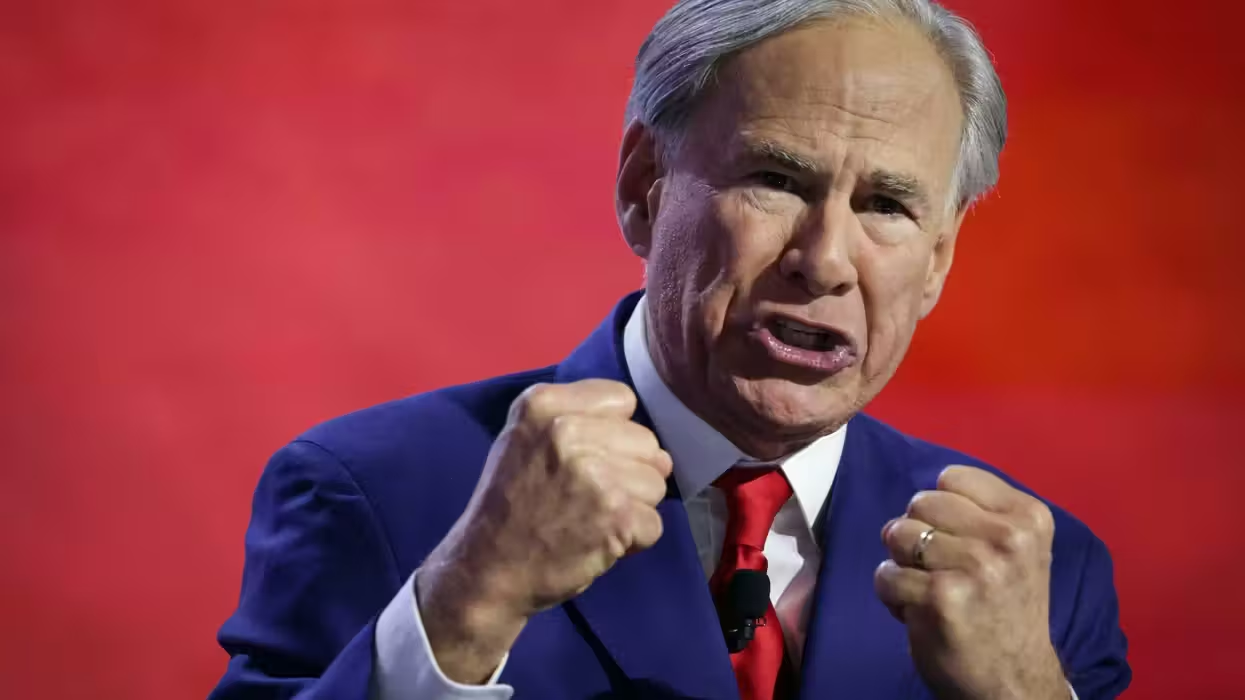
© 2025 Blaze Media LLC. All rights reserved.
It’s time Republicans stop thinking so narrowly on health care.
Not only do they refuse to fully repeal Obamacare, they are offering us a false dichotomy between doing nothing and passing a fake repeal that accelerates the death spiral without creating an alternative to the insurance cartel, and irretrievably sets into motion a perpetual need for bailouts. It’s all about the insurance companies now, but it doesn’t have to be that way.
We stand at a crossroads in dealing with the most important sector of our economy and the linchpin to our freedom and prosperity. Republicans have a unique opportunity to not only repeal Obamacare but to offer a vision that addresses the root of the health care problem: that government and the insurance cartel have cut the consumer out of the process, preventing health care from working like a real market – with all the competition, innovation, quality delivery, and choices associated with it.
Over the past week, we have posted several articles and podcasts (here and here) explaining why health care is so convoluted, who is at fault, and how it can be fixed. Yet, Republicans can’t seem to talk for two minutes about their beliefs on health care other than passing a blank bill with the word health care stuck in it. Ironically, health care is the one thing nobody is discussing. Everyone is discussing health insurance but failing to address why the price of health care is so over-inflated.
This system of third- and fourth-party payment for health care is unsustainable. All of the public and private funds are being sucked into the administration of government and cartel price fixing rather than the delivery of care. There’s a reason why the highest earners in health care are not the M.D.s, but the insurance cartel administrators. We are going to get single-payer either way. The question is if it’s going to be single-payer government takeover of health care or true free-market single-payer (i.e. the consumer pays the provider directly).
At present, the reason we have third- and fourth-party payments is because the cost of health care is supposedly too expensive for consumers to pay directly. But the reason why most health care is so expensive is precisely because of government interference and the insurance cartel, which has been given a monopoly to price-fix health care, thanks to tendentious treatment from the government.
It’s time Republicans offer a vision for fixing the health care problem, placing the consumer back in the driver’s seat, and cutting out the insurance cartel from government favors. This is a more compelling message than directly repealing Obamacare, would be more effective than repealing Obamacare, and offer us the only path to alleviating the epidemic of government dependency. Ultimately, it would make Obamacare, which deals with insurance, moot.
Rather than trying to fix the insurance cartel, it’s time to leave them in the dust and reduce the price of health care itself. It’s time to get the government out of any third- or fourth-party payer scheme and to stop manipulating statutes, subsidies, and the tax code in order to line the pockets of third-party payers.
Here are some guiding principles on true health care reform:
- Health care is not medical insurance
- The cost of health care should be solved before the cost of insurance
- Medical insurance, the way it’s currently constituted and propped up by government favors, is not the solution, it’s the problem and self-perpetuates a need for the cartel
- We should seek to eliminate all government influence that has led to third- and fourth-party payer and put the doctor and the patient back in the driver’s seat
- By fixing health care first and dealing with the “private” sector before the government dependency, we will reduce costs and make reforming Medicaid and Medicare a no-brainer
- The best way to offer a hand out is to give a direct handout – to empower the poor consumers to pay their bills directly rather than creating a market-distorting government program or lining the pockets of the venture socialist insurance cartel to administer a convoluted third-party program.
- Aside from the original sin of third-party payer, we must identify every area where government regulations or interventions inflate the cost of health care on the supply side
Were these principles to be followed, much of the impasse over Obamacare and the insurance issue would become moot and could even open the door for some bipartisan work.
As I laid out last week, Republicans could go along with fake repeal or no repeal, provided that they add two provisions: 1) a price transparency law on health care providers to end price fixing and bill the patient directly and 2) allowing any new health sharing association to form in order to replace insurance and grant them the same tax benefits through the individual and employer tax scheme as the insurance cartel has enjoyed for 60 years.
Taken together, these two reforms will dramatically lower the cost of health care by cutting out the need for the middle man and offer people a successful choice for catastrophic “health sharing,” which is much cheaper than insurance.
This would spawn a revolution in direct primary care, dramatically lower costs, spawn competition and innovation in delivery, eliminate the administrative leviathan crushing the practice of medicine, and leave the insurance companies with a choice – to die or to innovate without special government favors.
True Medicaid reform built upon first fixing the private market and direct primary care
Once prices of the actual care are reduced and the middle man in the private sector is cut out, we can then address the government programs from a position of strength. With cheaper prices on the supply side, we can now eliminate Medicaid as a market-distorting third- and fourth-party payer program, which is involved in odious price fixing. Instead, we can directly pay most of the bills of the indigent and chronically ill without a government insurance program.
We could set up regulated escrow accounts (similar to HSAs) for those who truly can’t afford even the reduced market price under our free-market system, and fill it with funds, depending on the income and need, to directly pay the medical bills. It would work much like food stamps, which directly pays for food rather than a convoluted middle man program (except the escrow account will prevent fraud).
Thus, even those who are subsidized would be paying direct primary care like everyone else. At present, 77 percent of Medicaid is managed by the private insurance cartel or paid to providers through a price-fixing scheme. Why should we be lining the pockets of insurance companies and some hospitals with taxpayer funds rather than empowering the patient to pay directly like everyone else?
Eliminating the market-distorting and price-fixing program will lower costs even further and allow for more funds to be used to directly pay the bills of those who actually need them. Those receiving these direct payments could make a choice whether to purchase a sharing program through the newly created health sharing associations or pay more out of pocket.
Either way, we must first lower the price of the actual commodity before we subsidize it. This is the difference between a Medicaid program that subsidizes an MRI at the cartel price of $5,000, or the real price of $350.
Cutting out the middle man will save money on the public side, deflate the cost-distortions on the private side, keep the government independent from the capricious whims of the insurance cartel, and offer everyone, including the poor, the ability to go anywhere for service and just pay the bill directly – all with increased choice competition, care, and innovation and without the interference and administrative nightmare of other parties.
Obviously, the government programs themselves are responsible for also distorting the price of health care, but we will never succeed in reducing and reforming those programs until we first fix health care on the supply side and in the non-government sector.
Once all government health care programs, including at least Medicare Part B, are transformed to direct subsidies so that the consumer can shop around for care on their own, choose their own provider, and pay their own bill, the programs can be structured to create incentives for those to save some of their unspent escrow payments so that the program doesn’t grow legs.
By definition, without the money being funneled through the insurance cartel and the hospitals, there is less political rent-seeking to keep bidding up the program through the circuitous cycle of price fixing, lobbying for more subsidies, and the threat to raise prices.
The amount of money saved from lowering prices, and as a consequence, the reduction in the cost of government subsidies, will conserve so much more money to deal with the thorniest issues of health care. Private charities and GoFundMe’s could easily mop up the rest of the problem.
Meanwhile, innovation will explode because now there will be choice and competition on the provider side to compete organically for all 300-plus million consumers rather than for price fixing within the government-run insurance cartel. There’s a failure of imagination and innovation to think beyond the failed government-distorted paradigm of health care and the notion that insurance should define health care.
There are numerous ideas to fix health care in America, but most of the problems are solved or preempted by removing the third party from the equation and empowering consumers and doctors to innovate and make the right choices, while preserving a safety net that will be much more effective than what we have today.
If we only had a party capable of articulating such a vision…
Want to leave a tip?
We answer to you. Help keep our content free of advertisers and big tech censorship by leaving a tip today.
Want to join the conversation?
Already a subscriber?
Blaze Podcast Host
Daniel Horowitz is the host of “Conservative Review with Daniel Horowitz” and a senior editor for Blaze News.
RMConservative
Daniel Horowitz
Blaze Podcast Host
Daniel Horowitz is the host of “Conservative Review with Daniel Horowitz” and a senior editor for Blaze News.
@RMConservative →more stories
Sign up for the Blaze newsletter
By signing up, you agree to our Privacy Policy and Terms of Use, and agree to receive content that may sometimes include advertisements. You may opt out at any time.
Related Content
© 2025 Blaze Media LLC. All rights reserved.
Get the stories that matter most delivered directly to your inbox.
By signing up, you agree to our Privacy Policy and Terms of Use, and agree to receive content that may sometimes include advertisements. You may opt out at any time.






